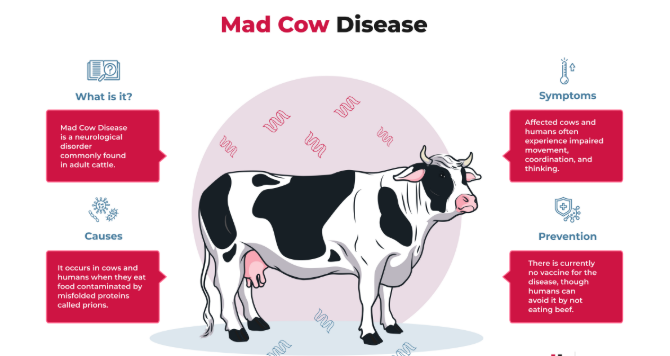This is the VOA Special English AGRICULTURE REPORT.
Animal health experts say all countries should guard against Mad Cow Disease. The experts urge countries to take steps to prevent Mad Cow Disease in animals. They also support measures to prevent the human form of the disease.
The experts met at a conference in Paris, France last month. The World Health Organization, the Food and Agriculture Organization and the World Animal Health Organization organized the meeting.
The official name of the cattle disease is Bovine Spongiform Encephalopathy, or B-S-E. It causes holes in the brain. Cows act strangely before they die. So it is known as Mad Cow Disease. B-S-E first appeared in Britain. All animals known to have the disease have been found in Europe or imports from Europe.
Scientists believe that eating infected beef may cause a similar disease in humans. This deadly disease is called Creutzfeldt-Jakob Disease. It cannot be cured. In recent years, nearly one-hundred people in Europe have died from Creutzfeldt-Jakob Disease.
Officials at the conference said more than thirty countries have banned the import of meat and bone meal and live cattle from western Europe. The officials said countries can be considered at risk for B-S-E if they imported such products from western Europe during the past twenty years. They said parts of Eastern Europe, Asia and the Middle East are at increased risk.
The Food and Agriculture Organization says banning imports ofmeat and bone meal, cattle and beef is not the only way to controlthe spread of B-S-E. The F-A-O suggests testing high risk animals,especially imported animals. And it urges animal feed producers totest the quality of their products.
F-A-O officials urge governments to establish a national action plan to control B-S-E. They say all countries should ban the feeding of meat and bone meal to cattle, goats and sheep.
The officials also urge countries to approve measures to control the killing of animals for food. They say this would reduce the chance of infected meat being sold as food for people. They also say the human food supply should not include the riskiest animal parts,such as the head and spinal cord.
This VOA Special English AGRICULTURE REPORT was written by George Grow.
